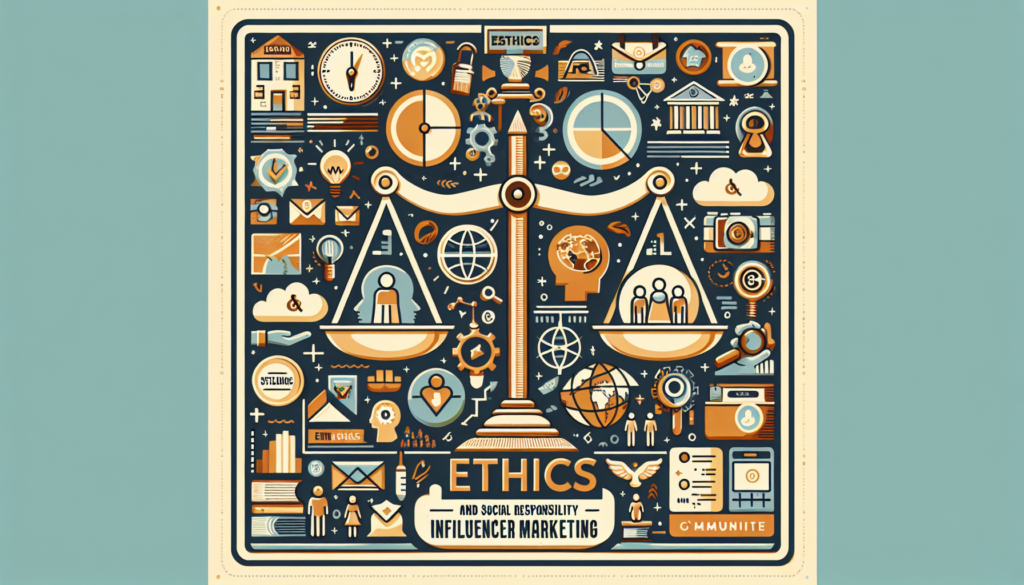In the proliferating digital age, the influence of public personalities on social media has reformulated parameters and strategies in the field of marketing. Influencer marketing is shaping up as a powerful tool to reach specific audiences, hyper-segmented and highly committed. However, the success of these advertising campaigns is not only based on impressive metrics of reach or engagement but also on the integration of ethical principles and social responsibility in their execution. This alignment has become an imperative that not only satisfies socially conscious consumers but also mitigates reputational and legal risks for the involved brands.
Ethics in Influencer Marketing: Building Trust and Credibility
Authenticity and Transparency
At the pinnacle of ethical practices in influencer marketing is authenticity. Influencers, as emissaries of brands, must maintain genuine coherence between the products or services they promote and their own values and lifestyles. This authenticity is reinforced by transparency, clearly indicating when a post is sponsored. Current regulations in various jurisdictions require these communicators to appropriately label their content, thereby avoiding deception and protecting consumer interests.
Respect for Privacy and Data
The ethical management of data and privacy has become central in online marketing. Influencers and brands must adhere to regulations such as the GDPR in Europe and others alike, ensuring that the handling of followers’ personal data is managed with utmost care and consent.
Social and Cultural Impact
Influencer marketing does not operate in a cultural vacuum. These individuals are opinion leaders who can reinforce or challenge stereotypes and social norms. It is essential that, as spokespersons for brands and products, they are accountable for the impact of their message and the values they promote.
Corporate Social Responsibility and Sustainability in Influencer Marketing
Promotion of Sustainable and Ethical Products
There is a growing expectation that brands articulate practices of sustainability and corporate social responsibility (CSR). Influencer marketing is an extension of the corporate identity and, as such, should reflect these commitments, giving priority to collaborations with influencers who align with the brand’s sustainability and ethical objectives.
Awareness and Social Activism
Influencers who use their platform for social good encourage a form of marketing with conscience. Brands can generate a positive impact by supporting social causes and collaborating with influencers who are active in these spheres, enhancing the beneficial reach and positive reputation of both parties.
Contributions to Education and Community Development
Through effective influencer marketing campaigns, companies can drive educational initiatives and support community development. This not only adds tangible value to society but also builds a sense of authenticity and commitment in the brand’s perception.
Practical Cases: Application of Ethics and Social Responsibility
Success stories, such as the collaboration between cosmetic brands and influencers committed to cruelty-free practices, illustrate how ethical practices can increase brand reputation and foster successful influencer marketing. On the other hand, the endorsement of eco-friendly products by influencers with a strong profile in environmental sustainability demonstrates how social responsibility can be a cross-sectional axis in marketing strategies.
A notable example of the reconciliation between influencer marketing and CSR is the partnership between clothing brands and public personalities advocating for ethical fashion and sustainable production. By promoting supply chain transparency and fair trade practices, these collaborations highlight the importance of choosing allies whose values are in tune with those of the company.
Evolution and Future Challenges
Regulation in Evolution
As influencer marketing matures, regulation continues to adapt. It is imperative that brands and influencers maintain constant vigilance of advertising laws and consumer protection to avoid penalties and maintain a trusting relationship with their audience.
Measuring Ethical Impact
The sector still needs to develop better tools and metrics to assess the ethical impact and social responsibility of campaigns. These metrics will provide not only a qualitative assessment but also a quantitative evaluation of ethical alignment and its correlation with business results.
Technological Innovations and Their Implications
As artificial intelligence and other advanced technologies increasingly intervene in the field of marketing, new ethical dilemmas and questions about authenticity and privacy arise. The industry must remain alert to these developments, ensuring that innovation does not translate into the dilution of ethical standards.
Influencer marketing, imbued with an ethical perspective and social responsibility, positions itself as a sustainable and effective strategy. The intersection between digital influence and social values becomes a formula not only profitable but also resonant for a society that increasingly values impact and corporate integrity. Brands that dare to innovate with conscience will not only stand out in the current market but also define the tone of marketing practices in the future.

